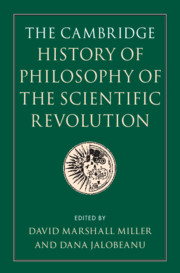Book contents
- The Cambridge History of Philosophy of the Scientific Revolution
- The Cambridge History of Philosophy of the Scientific Revolution
- Copyright page
- Contents
- Tables and Figures
- Contributors
- Preface
- Introduction The Disciplinary Revolutions of Early Modern Philosophy and Science
- Part I The Disciplines
- Part II Disciplinary Activities
- 8 The Art of Thinking
- 9 Astrology, Natural Magic, and the Scientific Revolution
- 10 Practitioners’ Knowledge
- 11 Medicine and the Science of the Living Body
- 12 Experimental Natural History
- 13 Celestial Physics
- 14 Applying Mathematics to Nature
- 15 Mathematical Innovation and Tradition: The Cartesian Common and the Leibnizian New Analyses
- 16 Mechanics in Newton’s Wake
- Part III Problems and Controversies
- Bibliography
- Index
13 - Celestial Physics
from Part II - Disciplinary Activities
Published online by Cambridge University Press: 14 January 2022
- The Cambridge History of Philosophy of the Scientific Revolution
- The Cambridge History of Philosophy of the Scientific Revolution
- Copyright page
- Contents
- Tables and Figures
- Contributors
- Preface
- Introduction The Disciplinary Revolutions of Early Modern Philosophy and Science
- Part I The Disciplines
- Part II Disciplinary Activities
- 8 The Art of Thinking
- 9 Astrology, Natural Magic, and the Scientific Revolution
- 10 Practitioners’ Knowledge
- 11 Medicine and the Science of the Living Body
- 12 Experimental Natural History
- 13 Celestial Physics
- 14 Applying Mathematics to Nature
- 15 Mathematical Innovation and Tradition: The Cartesian Common and the Leibnizian New Analyses
- 16 Mechanics in Newton’s Wake
- Part III Problems and Controversies
- Bibliography
- Index
Summary
It has long been recognized that astronomy was a catalyst of the Scientific Revolution, spurring on deeply consequential speculation about the nature of the cosmos and its physical principles. Yet the history of celestial physics is far richer than was thought a generation ago, and there is much to be learned about the origins of the field, particularly in the sixteenth century, when humanist activity brought forth a dazzling array of philosophical possibility—from reconsiderations of Aristotle and Islamicate commentary to the revival of Platonic, Epicurean, and Stoic worldviews. Celestial physics offered some of the most heated arguments for or against the Aristotelian cosmos, with controversial attempts to account for astronomical observation by integrating various causal innovations. This chapter will focus on a number of themes that mark celestial physics and cosmological speculation in the sixteenth and early seventeenth centuries: the order of the celestial bodies and their nature, the relationship between celestial and terrestrial things, the question of celestial animism or vitalism, and the status of the divine in celestial nature.
Keywords
- Type
- Chapter
- Information
- The Cambridge History of Philosophy of the Scientific Revolution , pp. 238 - 253Publisher: Cambridge University PressPrint publication year: 2022

